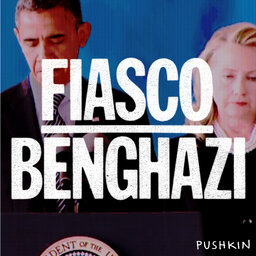Bush v. Gore: Bonus - Legacy.
The late Supreme Court Justice John Paul Stevens talks about his memories of Bush v. Gore, and why the ruling’s legacy, years after the fact, looks even worse than he thought it would.
In 1 playlist(s)
Fiasco
Host Leon Neyfakh transports listeners into the day-to-day reality of our country's most pivotal his…Social links
Follow podcast
Recent clips

Benghazi: Episode 6 - Radicals
1:08:43

Benghazi: Episode 5 - Greatest Hits
58:07

Benghazi: Episode 4 - Feckless
53:16
 Fiasco
Fiasco